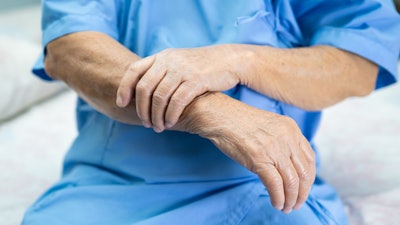
Medical cannabis is a subject of much debate. There is still a lot we do not know about cannabis, but researchers from the Department of Neuroscience at the Faculty of Health and Medical Sciences have made a new discovery that may prove vital to future research into and treatment with medical cannabis.
Cannabinoids are compounds found in cannabis and in the central nervous system. Using a mouse model, the researchers have demonstrated that a specific synthetic cannabinoid (cannabinoid WIN55,212-2) reduces essential tremor by activating the support cells of the spinal cord and brain, known as astrocytes. Previous research into medical cannabis has focused on the nerve cells, the so-called neurons.
"We have focused on the disease essential tremor. It causes involuntary shaking, which can be extremely inhibitory and seriously reduce the patient's quality of life. However, the cannabinoid might also have a beneficial effect on sclerosis and spinal cord injuries, for example, which also cause involuntary shaking," says Associate Professor Jean-François Perrier from the Department of Neuroscience, who has headed the research project.
"We discovered that an injection with the cannabinoid WIN55,212-2 into the spinal cord turns on the astrocytes in the spinal cord and prompts them to release the substance adenosine, which subsequently reduces nerve activity and thus the undesired shaking."
Targeted treatment with no problematic side effects
That astrocytes are part of the explanation for the effect of cannabis is a completely new approach to understanding the medical effect of cannabis, and it may help improve the treatment of patients suffering from involuntary shaking.
The spinal cord is responsible for most our movements. Both voluntary and spontaneous movements are triggered when the spinal cord's motor neurons are activated. The motor neurons connect the spinal cord with the muscles, and each time a motor neuron sends impulses to the muscles, it leads to contraction and thus movement. Involuntary shaking occurs when the motor neurons send out conflicting signals at the same time. And that is why the researchers have focused on the spinal cord.
"One might imagine a new approach to medical cannabis for shaking, where you - during the development of cannabis-based medicinal products - target the treatment either at the spinal cord or the astrocytes - or, at best, the astrocytes of the spinal cord," says Postdoc Eva Carlsen, who did most of the tests during her PhD and postdoc projects.
"Using this approach will avoid affecting the neurons in the brain responsible for our memory and cognitive abilities, and we would be able to offer patients suffering from involuntary shaking effective treatment without exposing them to any of the most problematic side effects of medical cannabis."
The next step is to do clinical tests on patients suffering from essential tremor to determine whether the new approach has the same effect on humans.